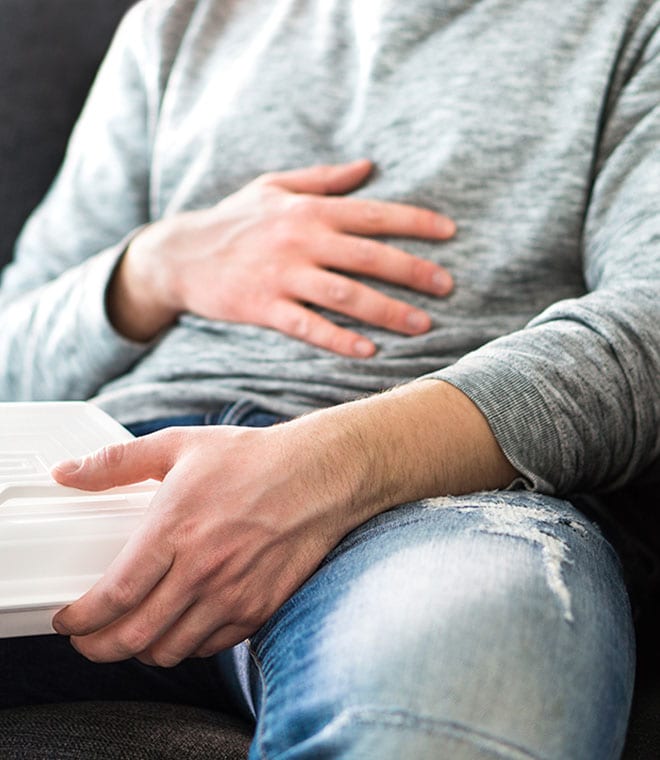Health
What is ulcerative colitis?
By Benjamin Renelus, MD, Gastroenterologist Nov 20, 2023 • 9 min
Also known as UC, ulcerative colitis is a chronic inflammatory condition of the large intestine that affects an estimated 600,000 to 900,000 people in the U.S. Although people may experience different degrees of UC, there are many treatments to help manage symptoms.
Understanding ulcerative colitis
UC occurs when the lining of the large intestine, or colon, becomes inflamed. A type of inflammatory bowel disease (IBD), UC can affect different parts of the colon.
Healthcare providers divide UC into subtypes, based on where the inflammation occurs. These subtypes include:
- Ulcerative proctitis: Inflammation confined to the rectum
- Left-sided colitis: Inflammation that starts at the rectum and continues along the left side of the colon, typically stopping along the splenic flexure, a curve in the colon located near the spleen
- Proctosigmoiditis: Inflammation in the rectum and the lower part of the colon known as the sigmoid colon
- Pancolitis: Also known as extensive colitis, inflammation is spread throughout the entire colon
Ulcerative colitis vs. Crohn’s: What's the difference?
Crohn’s disease is another type of inflammatory bowel disease that causes symptoms similar to ulcerative colitis. The main differences between the two conditions are:
- Location: UC only affects the colon, while Crohn’s disease can cause inflammation anywhere in the digestive system.
- Continuity: With Crohn’s disease, inflammation is usually patchy and separated by areas of healthy tissue, called “skip areas.” In people with UC, the inflammation is typically continuous.
- Depth: Inflammation associated with UC occurs only in the innermost lining of the large intestine, while inflammation from Crohn’s disease can develop in any layer of the digestive tract.
Causes of ulcerative colitis
At this time, healthcare professionals don’t fully understand what causes ulcerative colitis. However, the following factors are known to play a role:
- Genetics: Roughly 20% of people with UC have a close relative who also suffers from the condition.
- Immune system dysfunction: The inflamed colon associated with UC may occur because the immune system attacks healthy cells in the lining of the large intestine.
- Gut microbiome: In the digestive system, beneficial bacteria aid in digestion and fight harmful bacteria that cause illnesses. There is some evidence that people with UC may have an imbalance in their gut microbiomes.
Risk factors for UC include:
- Age: Ulcerative colitis is most common in people ages 15 to 30 and in individuals over the age of 60.
- Diet: A high-fat diet may be linked to an increased risk for UC.
- Medical history: People with other health conditions, particularly autoimmune conditions like psoriasis, may be at higher risk for developing UC.
Symptoms and signs of ulcerative colitis
Most often, UC symptoms develop slowly and worsen over time, but for some people, they start suddenly. Common symptoms of ulcerative colitis may include:
- Abdominal pain
- Bleeding from the rectum
- Bloody stools
- Cramping
- Diarrhea
- Inability to produce a bowel movement despite having a strong urge (tenesmus)
- Fatigue
- Fever
- Mucus and/or pus in stool
- More frequent bowel movements
- Nausea
- Unexplained weight loss
Signs and symptoms of UC vary depending on where the inflammation is located. For example, people with ulcerative proctitis may only experience rectal bleeding, while weight loss is most common in those with extensive colitis.
Ulcerative colitis diagnosis
To diagnose ulcerative colitis, your healthcare provider will likely first discuss your symptoms and medical history with you. Then, they will typically conduct a physical exam and order tests, which may include:
- Blood tests to check for anemia and rule out the possibility of inflammation, infection or other diseases
- Stool tests to rule out infections and other conditions
- Endoscopy, which involves inserting a large, thin tube into the colon to examine the lining and possibly collect tissue to biopsy
- Imaging tests like an MRI (magnetic resonance imaging) or CT (computed tomography) scan to get pictures of the rectum and/or colon
Ulcerative colitis treatment options
Healthcare providers may recommend a number of different treatments and lifestyle changes to help you manage the symptoms of ulcerative colitis. Your age, health history, type of UC, severity of symptoms and other factors can help determine which ones may be appropriate for you. The following are some treatment options for ulcerative colitis.
1. Ulcerative colitis medications: Medication therapy is a common treatment for ulcerative colitis. Some commonly prescribed medications for UC include:
- 5-aminosalicylates (5-ASA): These drugs help reduce inflammation and include balsalazide, sulfasalazine, mesalamine and olsalazine.
- Anti-diarrheals: Medications for diarrhea like loperamide may help with short-term severe diarrhea. However, they should be used with caution by people with ulcerative colitis. Ask your healthcare provider before taking these medications.
- Antispasmodics: These medications can help alleviate cramps related to UC.
- Biologic/biosimilars: These medications block certain proteins in the immune system to address symptoms of UC and include adalimumab, golimumab, infliximab, ustekinumab and vedolizumab, among other classes of biologics.
- Corticosteroids: Prednisone, budesonide and other corticosteroids may be prescribed to reduce inflammation in people with moderate to sevee UC.
- Immune system suppressors: Drugs like azathioprine, cyclosporine and 6-mercaptopurine may be prescribed to suppress immune system activity and ease symptoms.
- Small molecule medications: When other drugs don’t alleviate symptoms, doctors may prescribe small molecule medications, like ozanimod, tofacitinib and upadacitinib, to suppress the immune system.
2. Surgery: Surgical removal of the colon and rectum is another potential treatment for UC. However, healthcare providers typically recommend this more invasive approach when:
- A person has colon cancer or there are a large number of abnormal cells that make the future risk for colon cancer high
- Complications like severe bleeding are life-threatening
- Medications for UC don’t alleviate symptoms or symptoms can only be controlled with long-term use of corticosteroids, which can pose health risks
When possible, healthcare providers usually choose to perform an ileoanal anastomosis, where a pouch is created using the rectum and small intestine inside of the body, allowing stool to pass from the small intestine to the anus.
If this procedure isn’t feasible, an ileostomy will be necessary. Following this procedure, feces exit the body through a permanent opening in the abdomen called an ileal stoma and is collected in an external ostomy bag.
3. Lifestyle changes: Healthcare providers often recommend that people with UC make certain changes to their lifestyle to help reduce symptoms. These may include:
- Dietary changes: Cutting back on dairy products and eating smaller meals may be beneficial. Although there isn't a specific ulcerative colitis diet, healthcare providers often refer patients to a dietician to have a customized diet plan developed.
- Supplements: Iron supplements or multivitamins may be necessary for people who have anemia or trouble absorbing nutrients due to UC. Check with your healthcare provider before taking a supplement.
- Stress management: Because stress may worsen symptoms, healthcare providers may recommend deep breathing exercises, meditation, yoga and other relaxation techniques to manage stress.
- Stay hydrated: Make sure to drink plenty of fluids to stay hydrated, especially if you’re experiencing diarrhea. Drinks with caffeine and artificial sugars may worsen diarrhea.
Close monitoring for signs of colorectal cancer is also important for those with UC, as some types of the condition can increase the risk of developing this type of cancer.
Updated November 2023.
Sources:
- https://www.niddk.nih.gov/health-information/digestive-diseases/ulcerative-colitis/definition-facts
- https://www.niddk.nih.gov/health-information/digestive-diseases/ulcerative-colitis/diagnosis
- https://www.niddk.nih.gov/health-information/digestive-diseases/ulcerative-colitis/eating-diet-nutrition
- https://www.yalemedicine.org/clinical-keywords/pancolitis
- https://www.niddk.nih.gov/health-information/digestive-diseases/ulcerative-colitis/symptoms-causes
- https://www.niddk.nih.gov/health-information/digestive-diseases/ulcerative-colitis/treatment
- https://www.crohnscolitisfoundation.org/what-is-ulcerative-colitis/types-of-ulcerative-colitis
- https://my.clevelandclinic.org/health/diseases/10351-ulcerative-colitis
- https://www.mayoclinic.org/diseases-conditions/ulcerative-colitis/symptoms-causes/syc-20353326
- https://www.uclahealth.org/medical-services/gastro/ibd/what-ibd/ulcerative-colitis-vs-crohns-disease
- https://www.merckmanuals.com/professional/gastrointestinal-disorders/inflammatory-bowel-disease-ibd/crohn-disease
- https://www.uptodate.com/contents/definitions-epidemiology-and-risk-factors-for-inflammatory-bowel-disease
- https://www.aad.org/skinserious/infographics-psoriasis-ibd
- https://www.crohnscolitisfoundation.org/what-is-ulcerative-colitis/medication
- https://www.crohnscolitisfoundation.org/what-is-ulcerative-colitis/surgery/j-pouch-surgery




